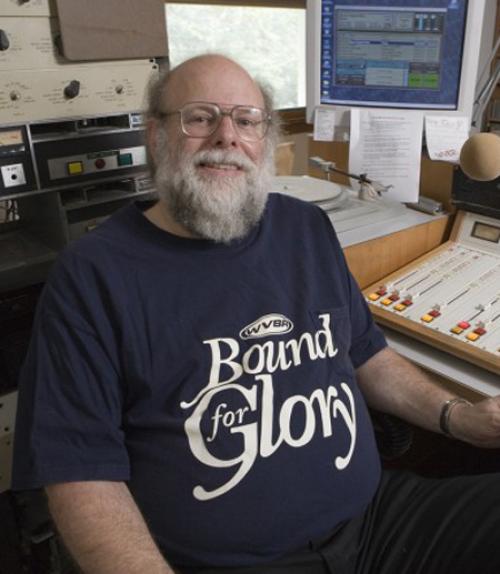Over the past 50 years the world has changed, but “Bound for Glory” has stayed almost exactly the same.
“Bound for Glory,” the longest-running live folk music show in the country, is still broadcast on WVBR out of the same room in Anabel Taylor Hall. It’s still hosted by its founder, Phil Shapiro, M.A. ’69, who before each show still regales performers with a version of the same speech explaining how folk music should be adapted to radio. (Don’t curse, for starters.)
And 51 years and some 1,500 shows into its run, audio recordings of every past performance are still stored in boxes in Shapiro’s home: on reel-to-reel tape, DAT tapes and, more recently, CDs. But now, as Shapiro contemplates retirement, Cornell University Library has begun digitizing these recordings, which are at risk of deteriorating and being permanently lost.
“The ‘Bound for Glory’ show is one of the relatively few records of the American folk scene for its duration,” Shapiro says. “The folk tradition is not static. It’s a living tradition. Anyone studying American music from the end of the 20th century to the beginning of the 21st century will find a really good example of how the folk scene has evolved, decade after decade.”
The Friends of Bound for Glory, a nonprofit group, paid for the digitization of 80 performances from the 1960s and 1970s through crowdfunding. Digitizing the full run of the show – nearly 2,500 hours of folk music – would cost $200,000, says University Archivist Evan Earle ’02, M.S. ’14.
“It’s a massive archive that documents a history of folk music from the 1960s to the present day. But these recordings are fragile in their current form – even playing them puts them at risk,” Earle says. “Digitization is the best way to ensure their preservation and legacy, and make them useful for a wider audience of fans and scholars.”
Although the show is usually not overtly political, folk music expresses how singers and listeners perceive the world around them, and the “Bound for Glory” archive helps trace views on campus about civil rights, the anti-Vietnam War movement, the growing financial divide, climate change, anti-natural gas fracking, the changing role of women and more, Earle says.
It may recall an earlier era, but the show is still going strong, with upcoming performances in 2018 including Bill Staines, Dan Berggren, Andy Cohen with Alan Kaufman, Guy Davis and Anne Hills – a lineup Shapiro describes as among the best in the show’s history.
Robin and Linda Williams on “Bound for Glory” in 2012.
Nationally recognized artists who have played “Bound for Glory” include Patty Larkin, Guy Davis, Utah Phillips, Aztec Two-Step, Mike Seeger and John Gorka.
The digitized shows, now preserved in the University Archives, include performances by musicians who went on to prominent careers, as well as those who vanished from the folk scene. A show featuring Howie Bursen, who sang on “Bound for Glory” in October 1969 as a Cornell B.A./Ph.D. student, is among the digitized performances; Bursen performed on the show again 48 years later, in February 2017.
Anyone interested can listen to the digitized shows on-site in the Division of Rare and Manuscript Collections in Kroch Library. They are not online because of copyright considerations, but Earle hopes some may be made available on the internet in the future.
“When Phil is done, the show is done. It’s not going to go on forever,” says Caroline Kerr ’75, Friends of Bound for Glory treasurer. “The archive means the show can continue to live for people, as long as the Cornell library is around.”
For more information on the digitization project, contact Earle.
This story also appeared in the Cornell Chronicle.




